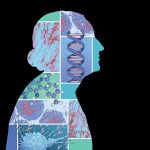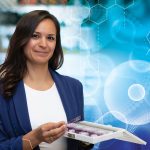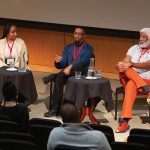Iron influences plant immunity and may promote resiliency against climate change
Plants and animals alike rely on iron for growth and regulation of microbiomes—collections of bacteria, fungi, and more that coexist in places like the human gut or the soil around a plant’s roots. Plants face a special challenge when acquiring iron, since the strategies plants use to increase iron availability alter the root microbiome and can inadvertently benefit harmful soil-dwelling bacteria. Professor Wolfgang Busch, first author Min Cao, and colleagues have discovered how plants manage iron deficiency without helping “bad” bacteria thrive—by eliminating IMA1, the molecular signal for iron deficiency in roots at risk of bacterial attack. Additionally, they found that this iron deficiency signaling pathway and the plant immune system are deeply intertwined.
Featured Stories
 Interaction + Infrastructure = Innovations in Healthy AgingSalk formula recalculates aging research, shifting focus to overall resilience and health span.
Interaction + Infrastructure = Innovations in Healthy AgingSalk formula recalculates aging research, shifting focus to overall resilience and health span. Salk mourns the loss of Nobel Laureate Roger GuilleminThe Institute remembers the “father of neuroendocrinology” for his many contributions to science and friendship to all.
Salk mourns the loss of Nobel Laureate Roger GuilleminThe Institute remembers the “father of neuroendocrinology” for his many contributions to science and friendship to all. Professor Jan Karlseder named Salk’s Chief Science OfficerOn February 1, Jan Karlseder started as Salk’s new senior vice president and chief science officer (CSO).
Professor Jan Karlseder named Salk’s Chief Science OfficerOn February 1, Jan Karlseder started as Salk’s new senior vice president and chief science officer (CSO).  Daniel Hollern–Turning a cancer diagnosis into a career in basic researchAssistant Professor Daniel Hollern pivoted his career trajectory after a family member’s life-changing diagnosis pushed his already-curious mind off a cliff of questions—starting with, “What can I do to help him?”
Daniel Hollern–Turning a cancer diagnosis into a career in basic researchAssistant Professor Daniel Hollern pivoted his career trajectory after a family member’s life-changing diagnosis pushed his already-curious mind off a cliff of questions—starting with, “What can I do to help him?” Jerry Sheehan–Collaborating shoulder to shoulder with scientistsWhen you think about a person who heads an information technology department, you might not envision them working shoulder to shoulder with research scientists. But that’s exactly the approach Jerry Sheehan is taking as Salk’s new chief information officer (CIO).
Jerry Sheehan–Collaborating shoulder to shoulder with scientistsWhen you think about a person who heads an information technology department, you might not envision them working shoulder to shoulder with research scientists. But that’s exactly the approach Jerry Sheehan is taking as Salk’s new chief information officer (CIO). Laura Mainz–Taking control after a cancer diagnosisLaura Mainz grew up in a tiny village in midwestern Germany, with just as many cows as people. But the sweeping landscape speckled with farms never swayed her toward plant biology—instead, her interest in the human body grew.
Laura Mainz–Taking control after a cancer diagnosisLaura Mainz grew up in a tiny village in midwestern Germany, with just as many cows as people. But the sweeping landscape speckled with farms never swayed her toward plant biology—instead, her interest in the human body grew. Black Association affinity group cultivates welcoming environmentThe Black Association at Salk (BAS) was one of the first affinity groups formed at Salk in 2020. Since that time, it has established itself as a welcoming space and go-to for resources for all Black Salk community members.
Black Association affinity group cultivates welcoming environmentThe Black Association at Salk (BAS) was one of the first affinity groups formed at Salk in 2020. Since that time, it has established itself as a welcoming space and go-to for resources for all Black Salk community members.






















































